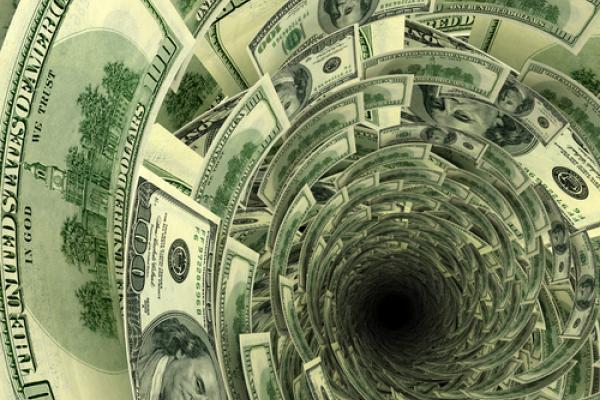In January, I received a phone message from a friend of ours. She needed to talk with me, she said. About something.
Not long after, I got an e-mail from Cordera (not her real name), our friend’s daughter:
“I am writing to you because my family and I have run into a problem. This summer President Obama passed the Deferred Action for Childhood Arrivals [of undocumented immigrants]. Over a long course of paperwork and appointments with the USCIS, I was able to receive a work authorized social security card and employment card. [But] without a student visa, I was not able to file for a loan. A few weeks after my first attempt, I found a bank that would be able to grant me a student loan with a US citizen or permanent resident as the co-signer. My father's uncle offered to help but . . . he was denied the credit.”
She wanted us to co-sign for a private loan in the amount of $35,000 to cover her first year of college. My heart sank. We couldn’t co-sign. Or we wouldn’t. I wanted to discourage her because of unfavorable and variable rates, immediate repayment, and long-term consequences of excessive indebtedness. I spoke with her university’s financial aid officer who intoned piously that the cost of the university experience was but one factor to consider: Cordera needed to hold onto her dreams, despite the crippling price tag of those dreams.
I urged Cordera to go to a community college and then transfer to the university, reminding her that time was on her side. She couldn’t wait and who could blame her? For years she had watched as her parents were exploited, pushed into the underground economy of the undocumented. Her family, she said, “believed deeply” in education. And now the waters of that promise seemed to beckon …
The Gospel of John tells a story of a crowd of paralytics, blind, lame – the poor – who gathered around a pool many believed would make you whole if you managed to get to the waters at just the right moment. People believed in the myth of the waters, despite how many invalids congregated there and for how long they remained there – decades in some cases. Jesus steps into this forlorn community and asks one of them, “Do you want to be made well?” He replies, “Sir, I have no one to put me into the pool when the water is stirred up; and while I am making my way, someone else steps down ahead of me.”
You wonder who those athletic, clear-sighted people were that leaped over the paralyzed and scrambled down to the water’s edge at just the right moment. Meanwhile, there is a pool, or actually a sinkhole, and around it many invalids.
Student debt recently passed the $1 trillion dollar mark. According to the Pew Research Center, while student loan debt has grown for everyone, the debt falls heaviest on the poor, with those in the lowest quintile owing nearly a quarter (24 percent) of their annual household income. Those among the top 10 percent of income owed just two cents of every dollar on student loans.
In response, the federal government introduced a “pay as you earn” plan which aligns repayment with student earnings. For their part, universities are offering shorter degree programs, redistributing grants to the beginning of a student’s academic career, and so on. Some believe that MOOCs (Massively Open Online Courses) may offer a solution to costly residential programs of education.
For many, America’s “pool of promise” – higher education – is turning into a sinkhole of debt.
In Jerusalem, a pool of promise turned into a sinkhole of prolonged frustration and helplessness. In this context, Jesus does not say, “Stay positive. You’ll get there, even if others don’t.” Jesus says, “Stand up, take your mat and walk.” Evidently, there was something false about this pool — that it didn’t and couldn’t make people whole.
But Jesus’ words do not only expose the falsehood of the system; Jesus empowers our humanity. After 38 years of being hidden in the “new normal” of poverty, Jesus says, “Stand up, take the mat that once defined you, and walk with your whole humanity.”
What would it look like for students to take hold of the injustice of the university and financial system, to claim it even as they rise above it? Students must play their part in making our society whole again. But Cordera, like many child immigrants, is not merely a student; she is a member of the church. Churches have long been bastions of hope for the marginalized, where sons and daughters of the poor are baptized into the promise of God’s justice and peace. Cordera’s faith in God plays no small part in her determination to believe in the promise of higher education. Indeed, while at college, she tells me, she attends mass and prays.
Her prayer seems such a small thing in such a vast system of inequity. Perhaps it is time for the church to claim her prayers as its own, to stand behind her and alongside her and students like her, as together we work for a better way.
Robert Hoch, Ph.D., ordained in the Presbyterian Church (USA), serves as a theological educator at the University of Dubuque Theological Seminary, Dubuque, Iowa. He is the author of numerous articles and two books, including Breathing Patterns: A Teacher’s Reflections on Calling, Equipping and Sending (Wipf and Stock, 2010), a collection of chapel sermons and meditations on the relationship between sanctuary and classroom, and his forthcoming work, By the Rivers of Babylon: Blueprints for a Church in Exile (Fortress Press, 2013), in which he argues for a robust expression of the church as faith community sent into exilic reality.
Image: Debt hole, Andrej Vodolazhskyi / Shutterstock.com
Got something to say about what you're reading? We value your feedback!
